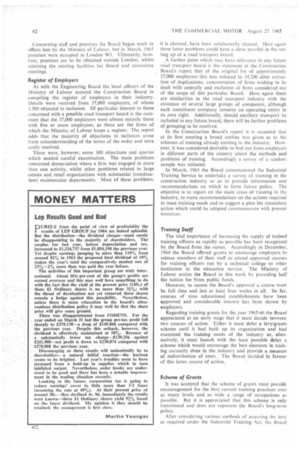_MONEY MATTERS
Page 64

If you've noticed an error in this article please click here to report it so we can fix it.
Lep Results Good and Bad
PURELY from the point of view of profitability the results of LEP GROUP for 1964 are indeed splendid. But the distribution—the dividend cheque—must surely
be disappointing to the majority of shareholders. The surplus for last year, before depreciation and lax, increased to 11,234,737 from £1,054,198 the previous year. Yet despite earnings jumping to mbre than 110% from around 82% in 1963 the proposed final dividend of 18% makes the year's total the comparatis ely modest one of 23%-2% more than was paid the year before. The activities of this important group are truly inter national. About fifty per cent of the group's profits are earned overseas and this may well have something to do with the fact that the yield at the present price (145s.) of these £1 Ordinary shares is no more than 31%; with the threat of devaluation not yet removed these shares remain a hedge against this possibility. Nevertheless, unless there is some relaxation in the board's ultracautious distribution policy it may well be that the share price will give some ground.
There was disappointment from FODENS. For the year ended on March 31 last the group pre-tax profit fell sharply to 1370,130—a _drop of £149.866 compared with the previous year. Despite this setback, however, the dividend Is effectively maintained at 10%. Because of a substantially lower tax charge—£139,256 against £241,908—net profit is down to £230,874 compared with £278,088 the previous year.
Discouraging as these results will undoubtedly be to shareholders—a natural initial reaction—the horizon seems to be brighter. Last year's troubles seem to have stemmed from a hold-up in supplies which in turn inhibited output. Nevertheless, order books are understood to he good and there has been a notable improvement in the trading situation recently.
Looking to the future, corporation tax is going to reduce earnings' cover to little more than F2 times (assuming the rate at 40%). At their present price of around 38s.—they declined 4s. 9d. immediately the results were known—these £1 Ordinary shares yield 51c/. based on the latest dividend. My opinion is they should be retained z the management is first class.
Martin Younger












































































































